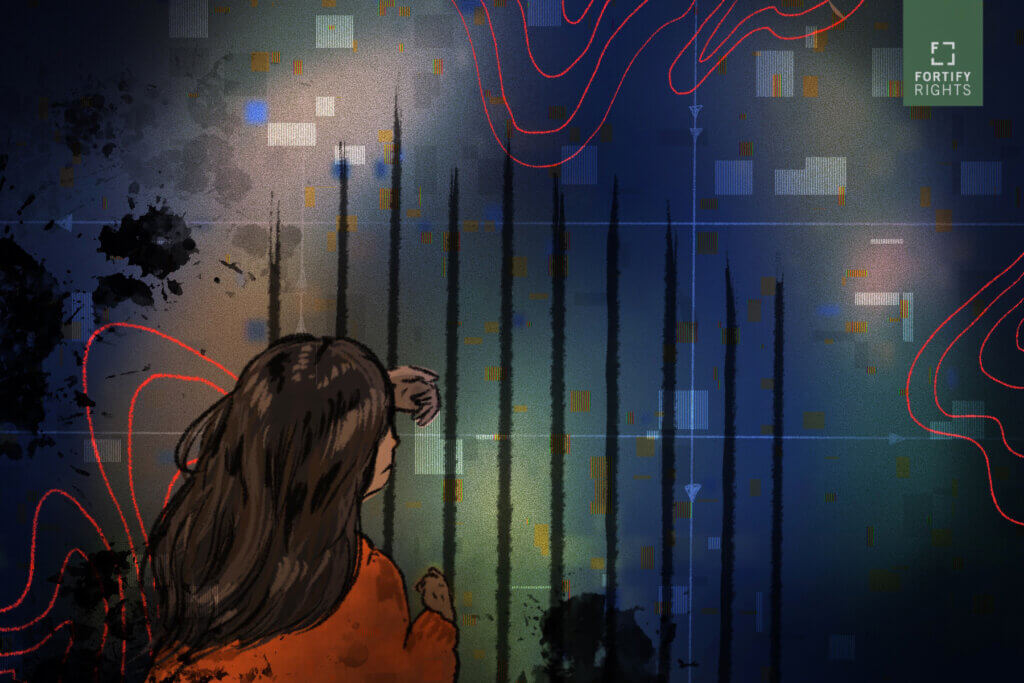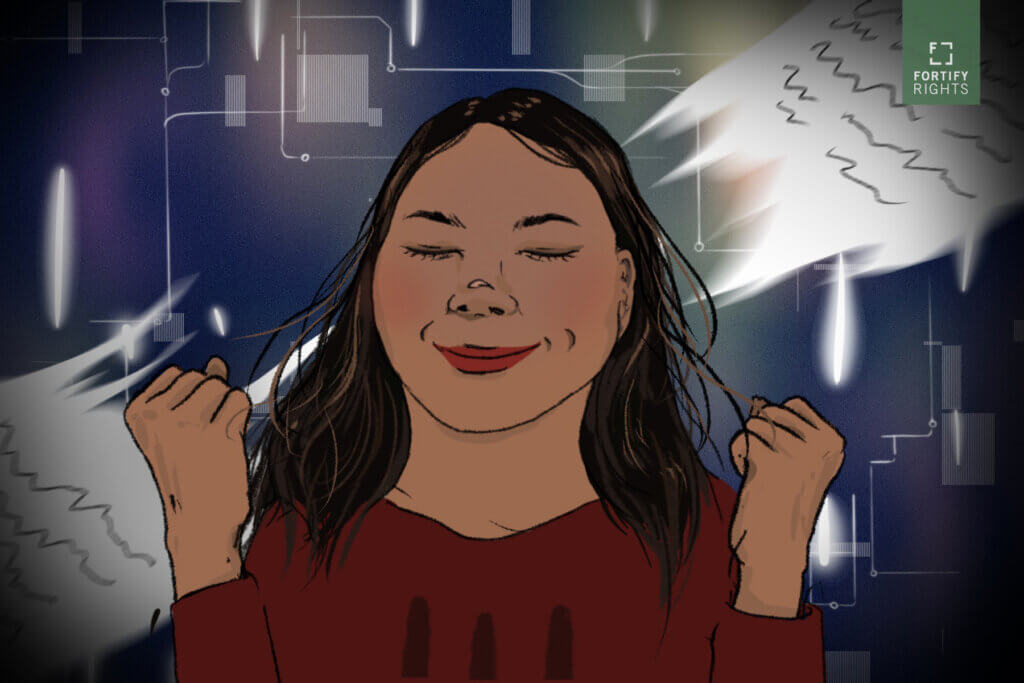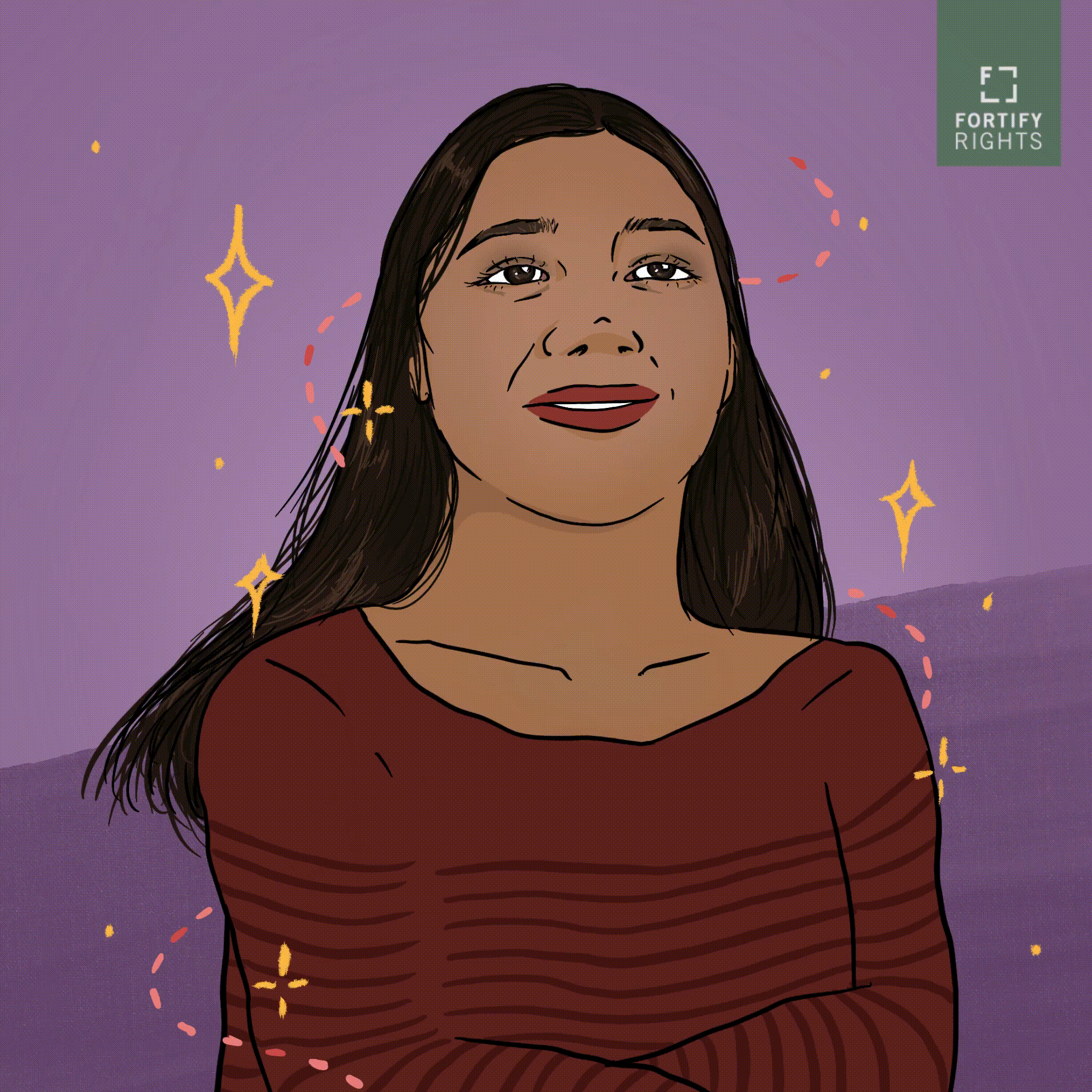“I believe that all of us, whether in Myanmar or elsewhere, should have the complete freedom and right to tell our stories and the violations we face, freely and publicly, with no repercussions on ourselves.”
Hla Hla Win
By Sippachai Kunnuwong
Hla Hla Win knows the danger of being a journalist in Myanmar. She has covered the country under four administrations, including under direct military rule, and was jailed for four years for her work. However, the 37-year-old told Fortify Rights, press freedoms are at an all-time low following the 2021 military coup d’état.
In its deadly putsch that began in February last year, one of the Myanmar junta’s initial moves was to shut down independent media, followed by the arbitrary arrest and detention of journalists. By the end of 2021, the country had become the world’s second-biggest jailer of news reporters after China.
“The way the [Min Aung Hlaing] regime treats civilians, activists, and students is more inhumane now,” Hla Hla Win told Fortify Rights. “We all have heard the horrific military interrogation stories—inhumane sexual assaults, harassment, and extreme torture. My interrogation during my arrest under the Than Shwe regime was not a terrible experience for me.”
“They want to punish us both mentally and physically”
Hla Hla Win started working as a video journalist in 2008 for the Democratic Voice of Burma (DVB), an exiled media outlet that was the subject of a 2008 Oscar-nominated documentary, “Burma VJ.” Not only did she face risks from her affiliation with the media outlet, but her video work was particularly dangerous.
Hla Hla Win explained:
During that time, the internet connection was not fast … I had to pass the memory cards to DVB News contacts or go and give them directly. I had to meet and be in contact with a lot of people, so there were a lot of risks for me. But for me, deep down, I am a person who doesn’t stand injustice and unfairness, so I continued to work.
In 2009, while working on a story about the anniversary of the Saffron Revolution—a Buddhist-monk-led pro-democracy uprising in 2007 that the military violently crushed—Myanmar authorities arrested Hla Hla Win and sentenced her to 27 years in prison. She was just 24-years old.
“I was the female journalist during that time who got the longest sentence,” she said, adding that she was convicted under a media-related law that was used to jail dissidents, among other charges.

Hla Hla Win recounted the conditions faced by imprisoned human rights defenders like herself, saying:
Since I am from Yangon, I should have been sent to Insein Prison in Yangon. But they sent me to a prison in Katha, Sagaing Region in January 2010 … They wanted to punish us both mentally and physically. It’s not enough that they took away my physical rights; they also tortured us mentally by making sure that we were far away from family, our home, and in a location with severe weather and different living conditions.
“Amending the laws that gave me a long prison sentence”
After nearly four years in prison, Hla Hla Win was released in 2012 during President Thein Sein’s quasi-civilian government.
“After I was released, I worked on amending the laws that gave me a long prison sentence,” she told Fortify Rights, adding that “it was very convenient to work as a journalist between 2012 and 2015 because [Thein Sein] was very keen to get credit.”
In seeking to get western sanctions lifted, President Thein Sein, a former military general, released more than one thousand political prisoners during his administration. In 2014, one of Hla Hla Win’s campaigns materialized. The 2004 Electronic Transactions Law, which led to her arbitrary imprisonment, was amended to reduce jail terms with fines.

Hla Hla Win continued to work with media organizations to assist persecuted journalists, including a case against Reuters journalists Wa Lone and Kyaw Soe Oo. The pair spent more than 500 days behind bars after investigating a military-led massacre of 10 ethnic-Rohingya people in Rakhine State during genocidal attacks in 2017.
In 2019, she co-founded the Myanmar Press Freedom Center.
“Our goal was to develop the media industry,” Hla Hla Win said. “We did media forums and training for journalists … We officially shut the center down on February 24, 2021, after the coup, and liquidated the assets as well to protect the team from arbitrary arrests.”
“Citizen journalists could fill in these gaps”
“On February 4, 2021, I jumped back into the reporting field,” Hla Hla Win said of her life during the coup. She spent hours everyday helping eight media outlets cover nationwide protests against military rule and the military’s deadly crackdowns.
After learning that her name was on the junta’s wanted list, she fled to Thailand in July 2021, at which point she started working for international organizations to assist Myanmar journalists at risk.
Hla Hla Win told Fortify Rights:
I was a trusted contact for journalists on the ground. I would be their first [point of] contact if they were on the run or arrested. I would provide technical support for the journalists in need or on the run, as well as if they wanted to flee to another country … Journalists trust me because of my background, including my experience in prison and extensive work in the media industry.

“After the coup, there was a major loss of resources in our industry due to escalating violence and crackdowns against journalists for doing their jobs,” Hla Hla Win said. “I believe this is where citizen journalists could fill the gaps.”
In May 2021, she co-founded Supporting Citizen Journalists Myanmar Organization (SCJM), a group that offers training for citizen journalists.
She explained:
We need to tap into the human resources from the states and regions and train local residents to report and send us news [on] women and children issues, human rights violations, and developments happening in their areas right away, so the news is coming out on time. Even if we can’t train all of them to become [full-fledged] journalists, this can be a network of citizen journalists or sources that we can always be in contact [with] for news on the ground.”
“It’s beyond journalism”
Despite the challenges, Hla Hla Win is determined:
Today, with advanced technology and the world being more connected, we can continue to do our job wherever we are in the world … Some of the journalists who crossed over [to Thailand] told me that they don’t want to move to a third country because they want to [be based] in Mae Sot and open an office [here] to continue reporting on Myanmar.
The U.N. refugee agency reports more than 70,000 people have fled from Myanmar to neighboring countries since the coup, seeking protection. Many aspire to seek asylum in western democracies. Not Hla Hla Win:
I love seeing places where society is developed, and everybody has full rights, for example, Norway…But do I want to move to Norway? No. I want my country and my society to be developed like that.
“For me, it’s beyond journalism. It’s freedom of expression,” she added. “The desire to make my country a better place is bigger than anything else in my life.”
Sippachai Kunnuwong is a Communications Associate with Fortify Rights. Follow him on Twitter @10pachai.
